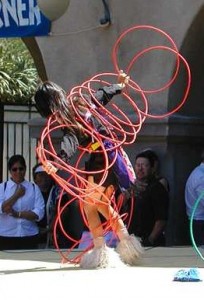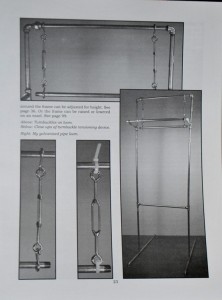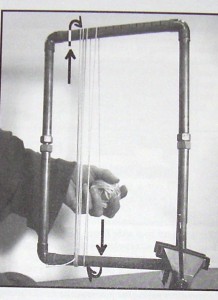Getting back or it’s more then about time!
I have just had the longest period of time not weaving since I star ted weaving tapestry in 1979. It’s been an interesting experience. Some good- some bad, but a necessary part of the circle of life. I am so ready to get back to tapestry weaving.
ted weaving tapestry in 1979. It’s been an interesting experience. Some good- some bad, but a necessary part of the circle of life. I am so ready to get back to tapestry weaving.
Hoop Dancing is often the stories of beginnings, the tale of the cycle of life, the stories of life. It is said that a good hoop dancer finds their stories in the rustle of grasses, the blowing of leaves and the whisper of the wind. I saw my first hoop dance in 1976. It was all so close to the beginnings of women competing in the hoop dance competitions. By this time hoop dancing had already joined so many other things in the pan-Indian movements that the large powwows were creating and causing.One can’t really say that Hoop dancing is from one specific tribe-anymore. Each group or dancer put’s there own twist or twists to the hoop dance. So it’s almost become a universal in many tribes. It has always seemed appropriate to me that women should compete and tell the story of life in something that was based on the cycle of life. But, I  am only a between and what do I know?
am only a between and what do I know?
On December 6,
my Fathers circle of life was completed, but is still entwined and connected with the rest of our circles of life that are connected and attached to the great circle of life. Dad was born in 1925 and lived a rich full life.
Life can be a messy, and confusing leaving great amounts of detrital/detritus, puzzlement and residue for some lucky soul in this case me to bring order to chaos.Transitions take time. So that’s how I have been spending most of the last month. Great amounts of sorting through papers and a life times accumulation from another’s life and wondering why they kept the things they did.
detritus (d -tr -tr  t t s)1. Loose fragments, such as sand or gravel, that have been worn away from rock.2. Matter produced by the decay or disintegration of an organic substance.detrital adjective s)1. Loose fragments, such as sand or gravel, that have been worn away from rock.2. Matter produced by the decay or disintegration of an organic substance.detrital adjective |
On the studio level or my personal work-With the exception of a 4 day retreat to the coast with
Spencer and having a student the last week of September and one student just leaving everything was been spent in a hectic, but fun workshop trips-roughly 7 in various parts of the country. Two of the seven- granted- were private students in the studio—but no actual weaving.
All I can say is it was a very good thing last night that Cathie Beckman let me weave on her loom. I was so jealous. I just wanted to grab the loom away from her and weave. Cathie had been weaving in the my studio for 3 days as anonly student. Her cartoon was based on a Jacob rose. A rose that I have not yet woven. This isn’t the photo of her rose, but it is a Jacob’s rose so that you can see what the colours and techniques were like. I hadn’t realized how starved I was to
begin weaving again. I haven’t woven in 2.5 months, because of everything that needed tending to in life at this point. It was neither a good thing or a bad thing just a specific time in life with very specific challenges.
Anyway, I wove today on a new/old piece that I had started prior to this break. A small narrow one inch strip of sunset. I am also starting two small rectangular designs. They are about sunsets on the ocean and a rock mossy wall over looking the ocean.
These are the five photos that I am considering weaving or variations and or combinations. They were all taken on my Xmas retreat. I really like the format of tapestries that are no larger 3 inches high and 7-9 inches wide. Usually they take me around 30-40 hours to weave- On a good week, it’s a weeks worth of weaving. I am really done with weavings that take 124 days to weave. (see prior blogs about “And he…) The bottom 2 photos are not dust but the sun shining through a rain squall.




A Little more, but about tapestry technique–
One of the discoveries I have been making is that many students don’t understand the importance with working at a very tight tension when weaving tapestry.
There are some very good reasons for having really tight tension.
It is so much easier to beat the warp down and cover the warp. The bubble of weft and the tightness of the warp help prevent lice(this happens when the weft won’t cover the warp as you weave. It is a play on words of the French term licier.) Turns are easier to keep from pulling in or being pushed out of place as you make turns. The tapestry is less likely to pooch or create a blister as you beat down or stretch the warp as you beat down. The hand of the fabric is more solid, you can’t but your fingers through the weave structure. When you beat down hard on a warp the is less likely to collapse later-squares stay square. Circles don’t be come ovals. etc. etc. –
The excuses range from lack of a good loom or the loom isn’t capable of having or maintaining a really tight tension. There are also those who have never been told how important a tight tension is to in the weaving process. I have seen so many people lately that are trying to weave on picture frames, looms with absolutely no tensioning device and then can’t understand why their tapestry have problems. In my whole career-35 years. I have only seen one or two people that have the actual strength to warp a picture tight enough to get really good results or not destroy the frames they are trying to weave tapestry on. And a handful of people who can actually get a really great tapestry from a picture frame.
Looms that are too wide can become too wimpy if the bars are not the proper size in relationship to the size of the loom width and metal fatigue sets in.
Or, they are trying to use a jack loom and trying to get a good shed. It is extremely difficult to get a tight enough warp on a loom with a jack type mechanism. And, yes, there are exceptions to every rule, but why fight the battle that most likely is lost before one begins.
How tight is tight enuff! Warp should be tight enough that it sounds like a harp or a guitar when you drag your fingertips across the warps at a right angle. Warps also should not be able to be displaced when you do this. If you are using a warping method such as circular or figure 8, over tighten the warp, leave it be for over night, come back and loosen the warp down to where it is the right tension-still tight enough to sound or thrum like a a musical instrument… In most cases it will even the warp tension across the whole width of the web of warp. Both loom pictures of looms –galvanized and copper loom are from the Copyrighted book So Warped that I co-wrote with Pat Spark.
the warps at a right angle. Warps also should not be able to be displaced when you do this. If you are using a warping method such as circular or figure 8, over tighten the warp, leave it be for over night, come back and loosen the warp down to where it is the right tension-still tight enough to sound or thrum like a a musical instrument… In most cases it will even the warp tension across the whole width of the web of warp. Both loom pictures of looms –galvanized and copper loom are from the Copyrighted book So Warped that I co-wrote with Pat Spark.
There are some really inexpensive solutions- such as building a copper frame loom with a large screw with large wing nuts or nuts that tension. There are directions in several of my books  for building copper looms. Archie Brennan also has a web site that has plans for one of these looms and so does the ATA web site with great diagrams. Parts can be bought very inexpensively at Habitat Re-Stores. If it’s a technical problem with cutting often times large box building supply places will have pipe in stock cut to smaller dimensions in stock or will cut it for you.
for building copper looms. Archie Brennan also has a web site that has plans for one of these looms and so does the ATA web site with great diagrams. Parts can be bought very inexpensively at Habitat Re-Stores. If it’s a technical problem with cutting often times large box building supply places will have pipe in stock cut to smaller dimensions in stock or will cut it for you.
Another solution is to build a pipe loom with galvanized pipe. Where everything can basically be screwed together. A little more expensive, but doable compared to the cost of many large tapestry looms.
Both of these looms cost in their small sizes are under 20-30 dollars for parts-sometimes less. The big frame loom made of galvanized pipe was less then 100 dollars. I worked on a larger version for years and wove 8 pieces for my master’s thesis on a loom like this sitting on the floor.
OKAY-that’s enough from now. I am off to weave. YEH!!!!!
kathe

Photo taken just barely South of the Sea Lions cave, on the Oregon coast Xmas 2012.
k
I am glad to be weaving again too. I so forgot about rigid heddle looms. They are terrible.
Have fun weaving Kathe! I'm glad you're back. I also have trouble with students not having tight enough tension on their tapestry looms… and those darn rigid heddle looms people always bring to workshops are the worst! Can't wait to see your next project.